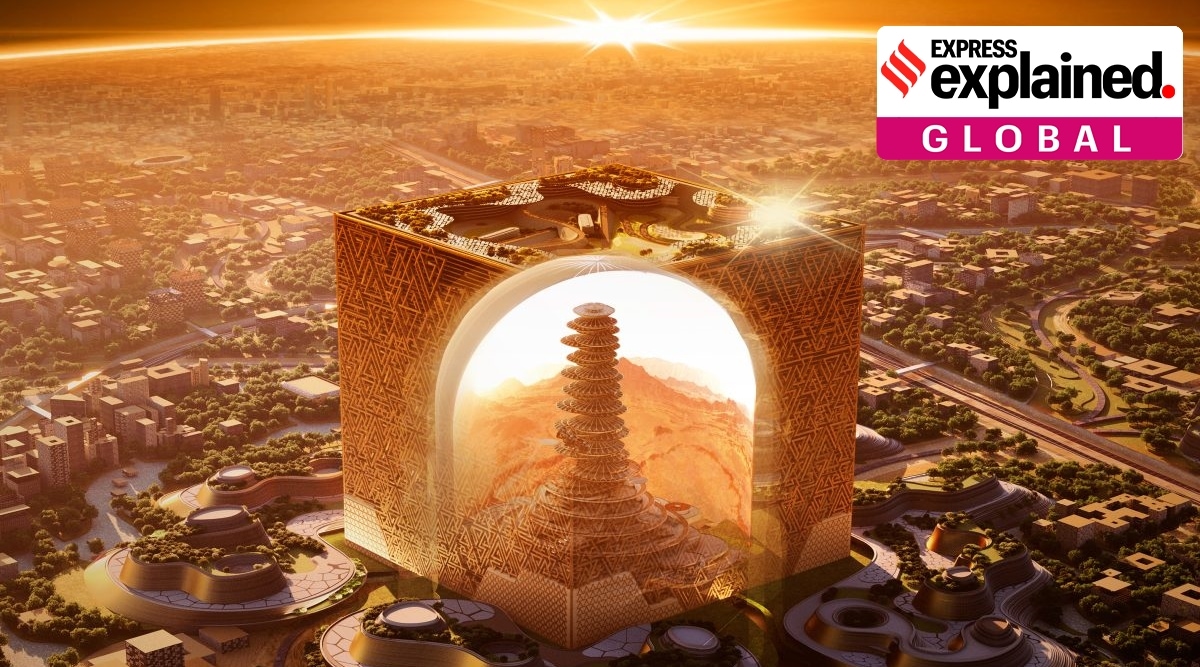What is Mukaab, a cube-shaped super-city to be built in Saudi Arabia that can ‘fit 20 Empire State Buildings’
A part of the New Murabba Project, which aims to transform downtown Riyadh, the Mukaab will boast state-of-the-art entertainment, dining and retail options. However, the Saudi Arabia government has come under criticism from certain people who consider the planned Mukaab to closely resemble the Kaaba.

On February 16, Saudi Arabia unveiled its latest grand plan to transform its capital city. The new project coming up in Riyadh is called the Mukaab – “cube” in Arabic. It will stand 400 metres high, wide and long, big enough to hold 20 Empire State Buildings, according to the Saudi kingdom’s Public Investment Fund (PIF).
The Mukaab will be at the heart of the New Murabba Project, a plan to create “the world’s largest and modern downtown” in Riyadh. Set to be completed by 2030, it will be helmed by Crown Prince Muhammad bin Salman.
What is the Mukaab?
To be constructed in central Riyadh, the Mukaab “will house over 100,000 residential units, 9,000 hotel rooms and 1.4 million square metres of office space, as well as dozens of entertainment and culture venues.” There will also be 1.8 million sq. metres of space dedicated to community facilities, the press release by the Saudi government said.
Spread over 19 sq. km, the new Murabba project will be built around the concept of sustainability and will add SAR 180 billion (roughly $ 47 billion) to Saudi Arabia’s non-oil GDP, the press release claimed. The Mukaab will be the highlight of this project.
It is currently unclear how much this project will cost or how the PIF will fund it.
Why a cube?
According to Saudi Arabia’s press release, the cubic shape of the Mukaab will “ensure the ultimate utilisation of space”. An immersive experience will be created inside the cube “using latest digital technology and holographics”
At the centre will be “a tower atop a spiral base which will be a premium hospitality destination” with retail, cultural, tourist, commercial and luxury residential attractions.
The Mukaab will be built using the modern Najdi architectural style – a twist on the traditional Najdi architectural style from the Najd region in the centre of the Arabian peninsula. This architectural style was perfected over generations to be best suited for the region’s desert climate – its design focuses on naturally controlling the climate inside the structure. Hence, the cube shape is not just yet another futuristic concept for a city, it will serve a functional purpose by limiting energy requirements inside it.
Is the structure inspired by the Kaaba?
However, the Saudi Arabia government has come under criticism from certain people who consider the planned Mukaab to closely resemble the Kaaba. The Kaaba, located in Mecca, the holiest city for Muslims, is a black cuboid structure considered to be the most sacred site in all of Islam. Every year, millions of pilgrims from across the world flock to Mecca for the Hajj pilgrimage where they circumambulate around the Kaaba.
The criticism led to #NewKaaba trending on Twitter. “Building a new Kaaba exclusively devoted to capitalism is a little too on the nose,” tweeted Murtaza Hussain, a journalist critical of the regime. The Gulf director at Democracy for the Arab World Now (DAWN), Abdullah Al-Aoudh tweeted, “For me, I only know the old Murraba,” referring to the Kaaba.
https://twitter.com/MazMHussain/status/1626271728090447873
However, the Saudi government has not declared any link between the planned Mukaab and the Kaaba. Its supporters have claimed that there are multiple cube-shaped structures across the region, primarily due to the functional benefits and simplicity of constructing such buildings.